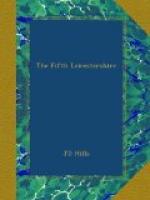Meanwhile, the Division on our left was not being idle. For the past week our Artillery in the salient had fired a half-hour bombardment every morning at 2-45, and on the 9th this was repeated as usual. The Boche had become used to it, and retired to his dug-outs, where he was found a few minutes later by the 6th Division, who had relieved the 14th, and were now trying to recapture all the lost ground. The surprise was perfect, and the enemy, never for a moment expecting an attack at that hour, were killed in large numbers before they could even “stand-to.” During the battle 200 of the 4th Lincolnshires occupied our support trenches, in case of any trouble on our front, and in the evening the rest of the Battalion arrived and took over the line, while we replaced them in Brigade Support—Battalion Headquarters, “B” and “C” Companies in the “Lake” dug-outs, “A” and “D” Companies in the Barracks of Ypres.
During the next six days we were worked harder than we had been worked before, digging, carrying, and trench revetting. Fortunately both halves of the Battalion had fairly comfortable quarters to which to return after work was over, though those in Ypres lived a somewhat noisy life. The barracks were close to the centre of the town, and each day the Boche fired his 17 in. Howitzer from dawn to dusk, mostly at the Cathedral and Cloth Hall, with occasional pauses to shoot at the Ecole de Bienfaisance, just outside the Menin gate. The shell, arriving with great regularity every 15 minutes, was generally known as the “Ypres express,” for it arrived with the most terrifying roar, buried itself deep in the ground before exploding, and then made an enormous crater. As it burst, not only did every house shake, but the whole street seemed to lift a few feet in the air and settle down again. In the barracks we had bricks and falling debris from the Cloth Hall, but nothing more, and these slight disadvantages were easily outweighed by the comfort in which we lived. Every man had a bed, and, as the barracks’ water supply was still in working order, we all had baths. A piano was borrowed from the Artillery, and provided us with an excellent concert, which was held in one of the larger rooms, and helped us to forget the war for a time, in spite of a 40-foot crater in the Barrack Square, and the ever-present possibility that another would arrive. Incidentally, the piano became later a cause of much trouble to us, for the police refused to allow us to move it through the streets




